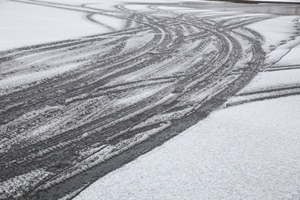Bad weather requires drivers to take greater care on the roads. According to a 2016 report from the AAA Foundation for Traffic Safety, 5,137 motor vehicle accident deaths occur in poor weather conditions annually. To prevent fatal accidents like these, you should know how bad weather makes roads more dangerous and how you can avoid a weather-related crash. Additionally, it’s important to note that bad weather is not always an excuse for causing an accident, so you should know how an attorney can help you recover damages if you were injured in an accident during bad weather.
Why Winter Driving Is Riskier
Winter conditions not only create greater risk for an accident, they can also exacerbate the consequences of a crash. However, you can better prepare yourself to prevent an accident by understanding how winter roads are more dangerous:
- Roads are more slippery. Rain, sleet, and snow—combined with freezing temperatures—can mean ice or decreased tire friction. Additionally, wet roads often cause oils to resurface and create slicker roadways.
- Visibility is diminished. Depending on temperatures and storm severity, rainfall, snowfall, and fog may negatively affect visibility—meaning a driver could have trouble seeing other cars, obstructions, and lane boundaries.
- Roads may be obstructed. If snowfall is heavy or winds are blowing at high speeds, visibility may be obstructed, or the snow may pile up and block the roadways.

Preventing a Winter Crash
In bad weather, both the weather conditions and driver negligence can contribute to a crash. Because roads are so dangerous and because other drivers may not be cautious enough, you need to plan ahead and drive more carefully to avoid a crash.
Before Hitting the Road
A well-maintained vehicle is key to preventing a crash—especially in winter—so it’s important to check your vehicle’s main systems, ensuring they are in good working order. This may include making sure that your:
- Brake mechanism and fluids are working
- Brake pads are not too worn
- Tires are appropriate for conditions
- Tires have sufficient tread depth
- Windshield wipers are effective in clearing the view without streaks
- Windshield, windows, and mirrors are free from liquid and ice
- Headlights, taillights, and signals are in working order
- Entire car is cleared of excess snow
While Driving
Other drivers may not approach winter conditions with extra caution, so it’s important you’re prepared to drive safely and avoid riskier drivers by:
- Increasing your following distance. When roads are more slippery, it’s crucial to give more space between you and the driver in front of you. If you need to stop suddenly, you’ll have plenty of room.
- Keeping an eye out for black ice. Although slower speeds and a good braking system can help you should you find yourself driving on black ice, it’s also important you stay aware of the roads. Watch for shiny spots, glares, or reflections on the asphalt, and avoid them as much as possible by changing lanes or veering slightly.
- Driving at slower speeds. It’s smart to drive below the speed limit in slippery conditions. Keeping a speed appropriate for conditions isn’t just the law—it’s also safer.
- Using low-beam headlights. In foggy conditions or on wet roads, high-beam headlights can limit visibility or create a glare. Additionally, Virginia law requires that you have your headlights on when you have your windshield wipers on.
Another Driver May Cause a Crash
Even if you take every precaution, another driver could still be distracted or drive recklessly and injure you in a crash. Because Virginia is a pure contributory negligence state, it’s important you consult with an experienced personal injury attorney who can show that you are not even 1% at fault for the crash.
A Trusted Attorney Can Help
A car crash can leave you with unplanned medical bills, property damages, and lost wages. If you have questions about your accident, the team at Kearney, Freeman, Fogarty & Joshi is prepared to answer them, help you understand your legal options for compensation, and build a strong case in your favor. To speak with a member of our team, fill out the online contact form on our website.
|
Related links: |

